How Award Winning Food Blogger Heifa Odeh is Making Cooking More Approachable
Community
|
Apr 7, 2021
|
10 MIN READ
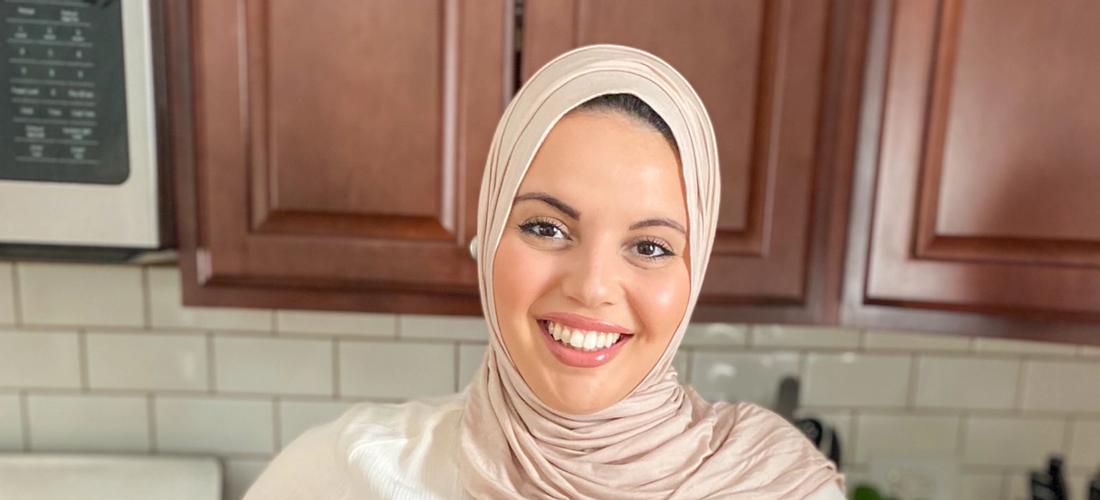
Heifa Odeh, of Fufu's Kitchen
Heifa Odeh grew up loving cooking and the classic Arabic dishes made by her Palestinian mother and grandmother. Instead of watching Nickelodeon as a kid, she watched Food Network! She was a teacher and cake decorator by profession until marriage brought her to Chicago and the unfamiliar life of a newlywed. So, she decided to turn to her first love in life: food. Three years ago Heifa began a website called Fufu’s Kitchen “to preserve the recipes of my heritage that I was taught by generations of women in my family.”
Since then, she has become an award-winning food blogger and just launched her first series of Middle Eastern cooking courses focusing mainly on Palestinian cuisine. She says, “I am approachable in my way of cooking, so dishes that always seem intimidating will, Insha’Allah, be a piece of cake.” The course includes 20 videos, a Middle Eastern pantry guide, meal plans, Heifa’s e-book Soufrati and loads of bonus content.
I sat down recently to talk with Heifa, who is also one of Haute Hijab’s Brand Ambassadors, about why she is so passionate about food blogging, what her favorite “go big or go home” meal is to make, what even a novice can cook and how she plans for suhoor and iftar in Ramadan.
Where does your love of cooking, especially Middle Eastern cuisine, originate from?
Where does your love of cooking, especially Middle Eastern cuisine, originate from?
I wish I could pinpoint this but I always loved food, especially Arab cuisine, as it is what I knew most and best. From a young age, I remember that I would watch the Food Network channel for hours on end while others were probably watching Nickelodeon.
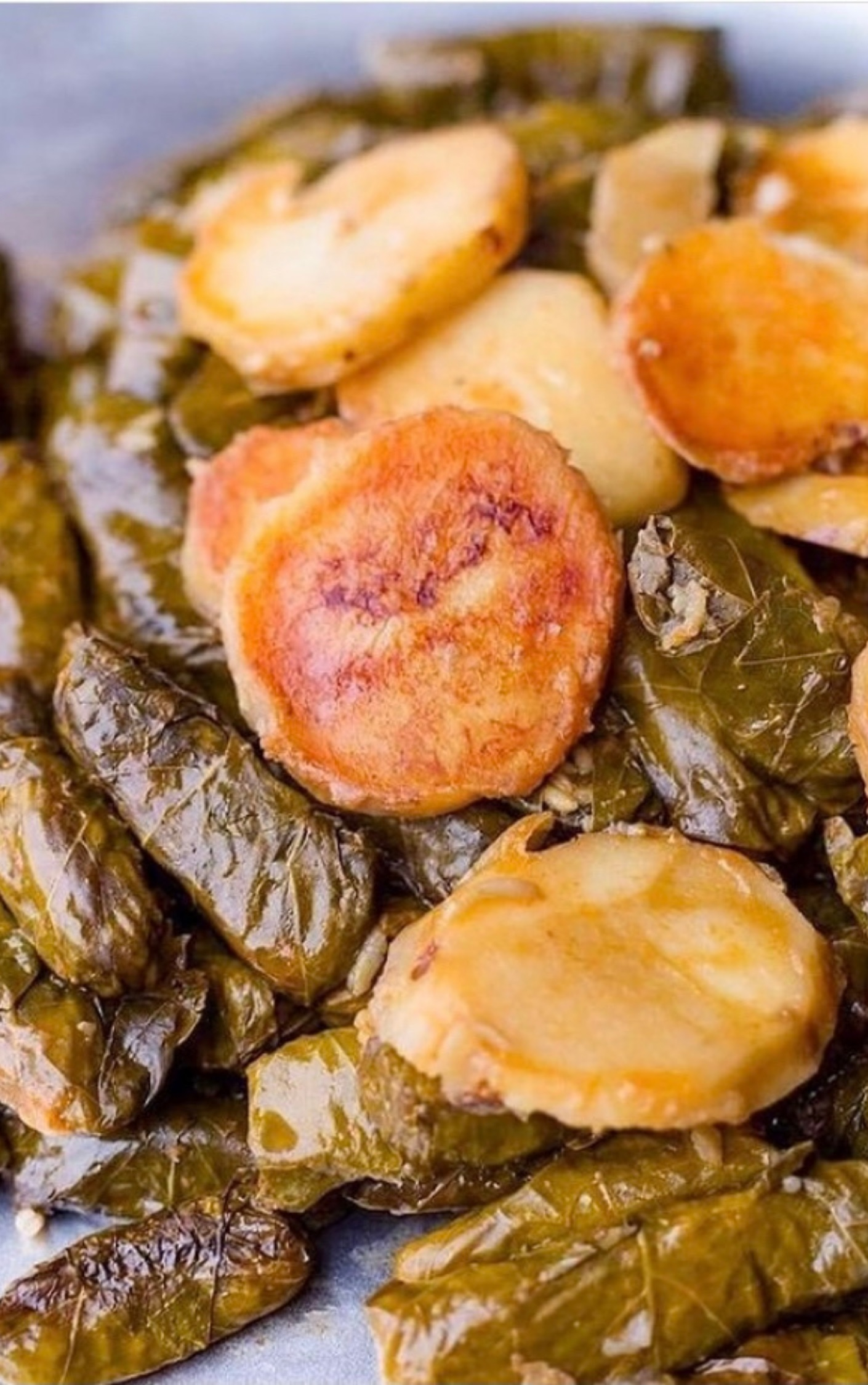
(Image: Stuffed grape leaves – a fan favorite in the Middle East.)
My mom also is a phenomenal cook and baker. Watching her gracefully own the kitchen and everyone enjoying her food made me love cooking even more. I remember I couldn’t wait until I had a kitchen of my own one day to cook and share my love for this cuisine with others, and now I am.
You were a teacher and a professional cake decorator before becoming a food blogger and recipe developer. Why did you move into this area of work?
You were a teacher and a professional cake decorator before becoming a food blogger and recipe developer. Why did you move into this area of work?
Two years prior to getting married, I was a high school teacher at an Islamic school while working part time at an Italian bakery. I worked at that bakery since the age of 15 and stayed for 10 years. My love for cake decorating stemmed from there; and it was something I also did on the side, as it was definitely a passion of mine.
When I moved to Chicago from New Jersey after marriage, I found myself lonely and missing my family’s cooking. I knew that if I created meals nostalgic to my childhood and upbringing, then maybe Chicago would feel more like home. My husband suggested creating a food blog for me to document these recipes. The rest is history! Here I am, three years later as an award-winning food blogger. It has definitely been so fulfilling teaching others how to cook and preserving my Palestinian roots with food.
Why produce a video series on Middle Eastern cooking now? What do you hope to achieve with it?
Why produce a video series on Middle Eastern cooking now? What do you hope to achieve with it?
There is a need for it. If you look at the cooking shows on television, there is no representation of Arab cuisine. If you were to search the internet for a cooking course on this cuisine, you will not find much of anything. I knew that it is something I wanted to create, as I love to teach and I love to cook. If it weren’t for the pandemic, I would probably be hosting cooking classes and supper clubs but I had to pivot.
I am so proud of this production. It is hands down my biggest achievement to date in my food blogging career, and I am truly looking forward to people getting their hands on it and learning so much. My hope is to make anyone who takes this course will feel much more confident in their own kitchen cooking this delicious cuisine.
I always say that cooking doesn’t have to be intimidating or stressful. It can be joyous and approachable. I really do my best simplifying some of the most traditional Middle Eastern dishes, so anyone feels like they can do it!
Where does the name, Fufu’s Kitchen, come from?
Where does the name, Fufu’s Kitchen, come from?
My father always called me Fufu as a nickname, and it caught on to where other family members would call me Fufu too. Although, my name is Heifa many people do know me by Fufu, hence Fufu’s Kitchen.
What are some of your favorite dishes to cook for flavor and fun?
What are some of your favorite dishes to cook for flavor and fun?
It is always so hard for me to pick favorites! To begin with, I am not the most decisive person! But if I had to choose, I really find pleasure in making homemade dough. It’s fun and enjoyable to see dough come to life and be shaped into different designs, then topped and stuffed with multiple fillings. I love making fatayer (Middle Eastern savory pies)! The most traditional fillings are cheese, meat, spinach, and zaatar, but you can really have fun with it and do whatever you like! The dough is your blank canvas. I actually teach how to troubleshoot dough in my course as well as make all the yummy fillings for fatayer!
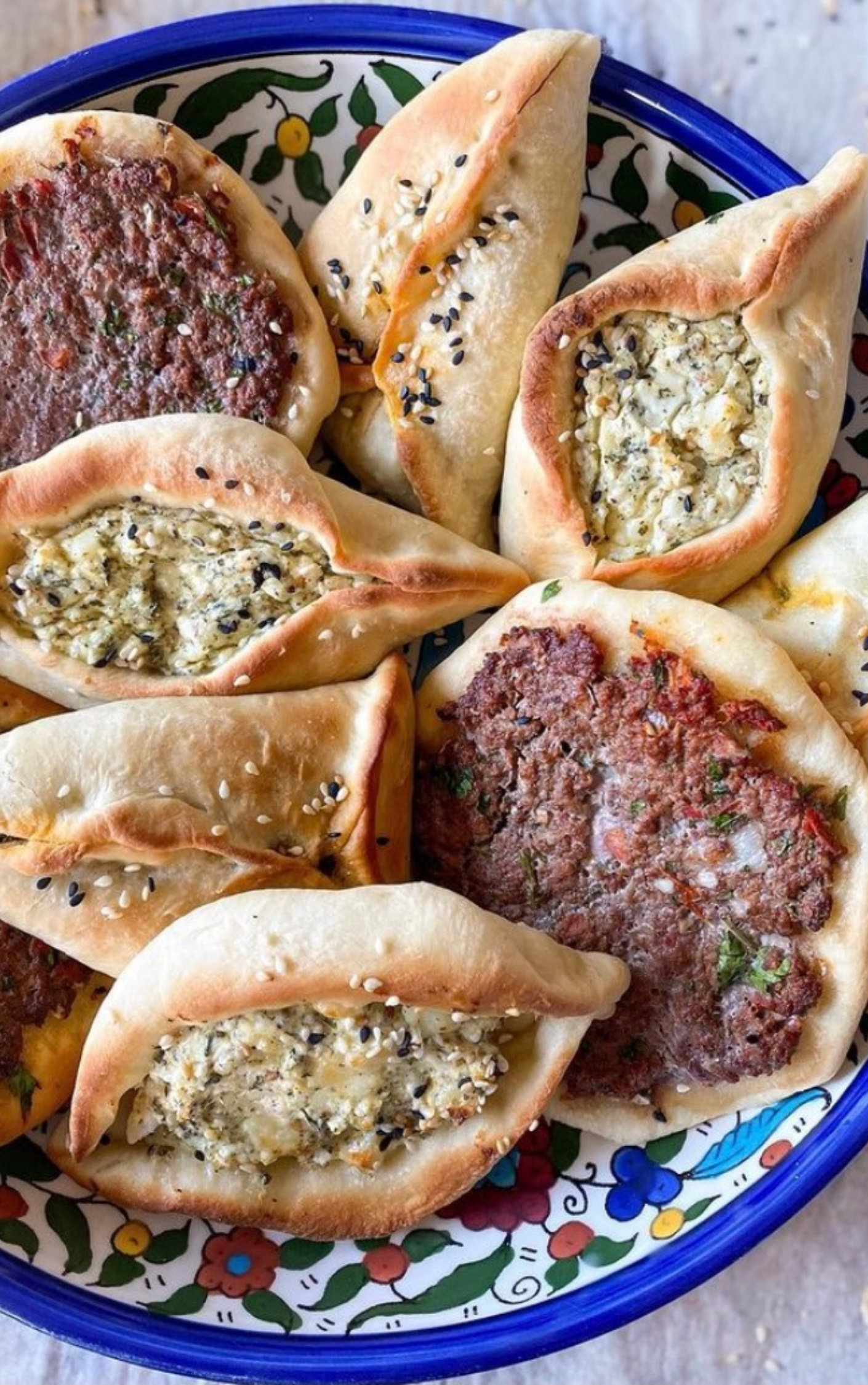
(Image: Heifa's famous fatayeh as mentioned above.)
What are some of your favorite dishes to cook for nostalgic reasons?
What are some of your favorite dishes to cook for nostalgic reasons?
Hands down, I would say Dawali Yalangi (vegetarian stuffed grape leaves – see earlier image). This is easily one of my favorite Arabic dishes; when my mom made this dish, my day was always made. This is now my signature dish; I made sure to master it. Every time I make it, I am transported right back to my mother’s kitchen enjoying these lovely tangy grape leaves that are a labor of love, but so worth it.
It is actually one of my favorite classes in my course, as you can see the excitement in my eyes while I make this dish! I also simplify it for those who may find it intimidating to make this time consuming yet very popular meal!
What if someone is a complete novice in the kitchen - what recipe from your repertoire would you tell them to start with?
What if someone is a complete novice in the kitchen - what recipe from your repertoire would you tell them to start with?
I would recommend for them to try something that they are familiar with. One of them being shawarma. Shawarma, although a very popular Middle Eastern street food dish, is known universally. Definitely give my chicken shawarma recipe a try as it is so simple to put together, and your taste buds will be dancing! Enjoy it in a wrap, pita, or a bowl with all your favorite fixings!
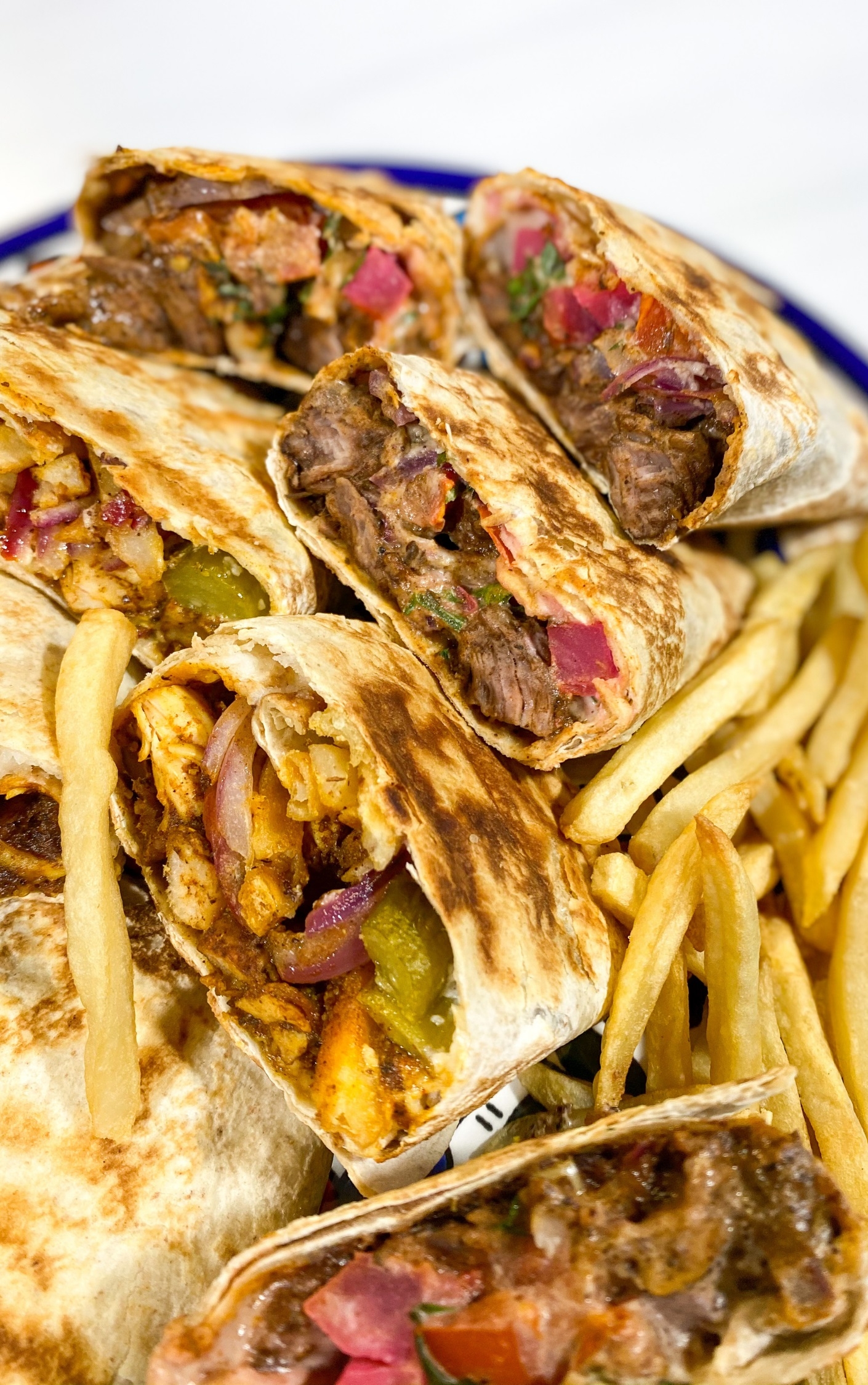
(Image: A classic shawarma sandwhich, as made by Heifa. Mmmm...we can smell it from here!)
If you’re going to go big (or go home) on a dish, what do you make?
Mansaf. This is a dish that often intimidated me as there are several layers to this dish. It is Jordan’s national dish that involves a layer of thin bediun bread known as shark that is drizzled with a homemade yogurt sauce, then topped with fluffy rice, which is adorned with tender chunks of lamb and more yogurt.
It is a meal that stands on its own. Nothing else is needed but this at the center of the table. It’s another recipe that I share in my course that is just super delicious! It is also one of my most requested meals that my mother makes for me when I go visit. I love it. My whole family does, so it was only right that I learn how to make it from my mother and share in my class!
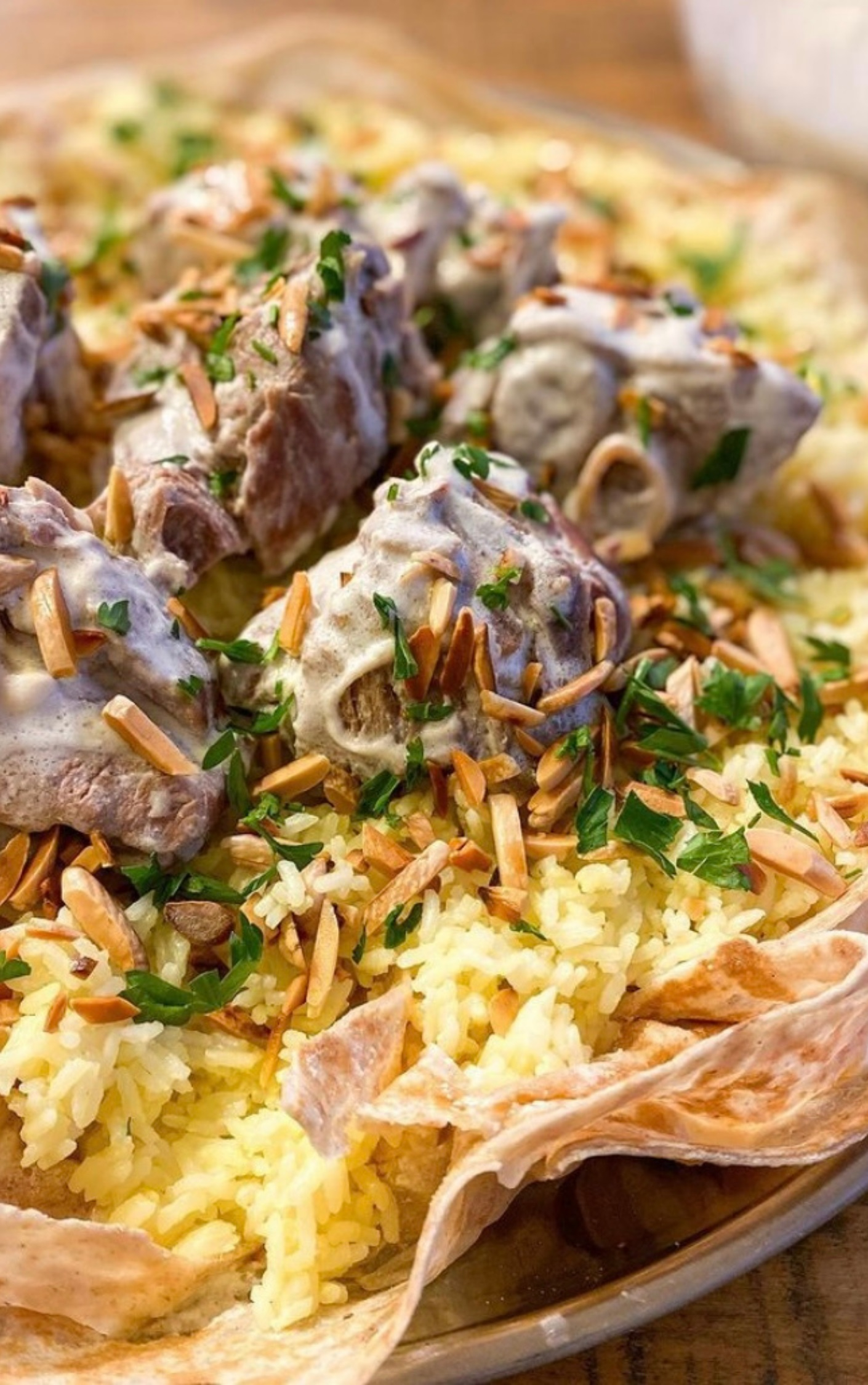
(Image: Mansaf, Jordan's national dish, as described above.)
Ramadan is almost here! What are your classic suhoor and iftar dishes? What are good things to nourish you but are easy to make in suhoor?
Ramadan is almost here! What are your classic suhoor and iftar dishes? What are good things to nourish you but are easy to make in suhoor?
I love this time of year as I am sure many other Muslims do as well. I don’t have a classic iftar dish as it really depends on what my husband and I may be craving that day or what is attainable that day. Most times I go with the flow when it comes to iftar or plan the night before what protein to take out of the freezer and work with the next day. I only really plan if I am having a gathering over for dinner.
As for suhoor, I love to enjoy dates and fruit, especially fruit packed with lots of water, such as watermelon. I always keep a large tupperware in the fridge of cubed watermelon to have as a healthy midnight snack in Ramadan. The dates are also such a fantastic source of nutrients in just one bite that they make for a quick nourishing late night snack as well. Overnight oats is also a great source of fiber and is filling! I often make this for suhoor, as it is easy and hearty.
What are some great things to eat when you break your fast and can be done by any level of cook?
I try to create meals that are wholesome and packed with nutrients after breaking fast. I think it is very important that we nourish ourselves. Typically, this meal will involve some sort of refreshing salad, like a classic fattoush. Then, some sort of grain like rice, frekeeh, or quinoa paired with a flavorful protein! A very popular meal is makloubeh, which is an Arabic rice dish that involves vegetables and typically lamb or chicken then served with salad and yogurt. It is a complete meal and pretty beginner friendly. I do show how to make this in my course!
Often we end up talking a lot about food in Ramadan when it is a month of fasting. Why do you think that is?
I think it is something we can’t help but look forward to after a long fast. It can be cravings or just excitement to enjoy a delicious meal with loved ones. However, Ramadan isn’t about food but instead worship, time of reflecting and purifying one’s soul. I believe in planning and setting goals for each day. I am a planner, especially if I want to juggle a few things like reading the Quran, praying extra salahs, listening to Islamic lectures and creating a nourishing delicious meal for my family. I like to keep a checklist so I can stay on track for the day with what I want to achieve, and I think this would be great in Ramadan for those who do a lot of juggling!
For some, cooking has become a great new hobby or passion in these times of sheltering-in-place and eating at home – has it been that way for you?
For some, cooking has become a great new hobby or passion in these times of sheltering-in-place and eating at home – has it been that way for you?
As I am sure you have realized by now, I have ALWAYS loved cooking and baking and really all things food! But, I will say during the pandemic that passion has increased even more; I saw more of a need in my industry to help others who are now sheltering in place and want to learn how to cook for their family. It is a busier time for me and many other food bloggers and recipe developers, as there was a need for recipes that were quick, easy, attainable yet delicious.
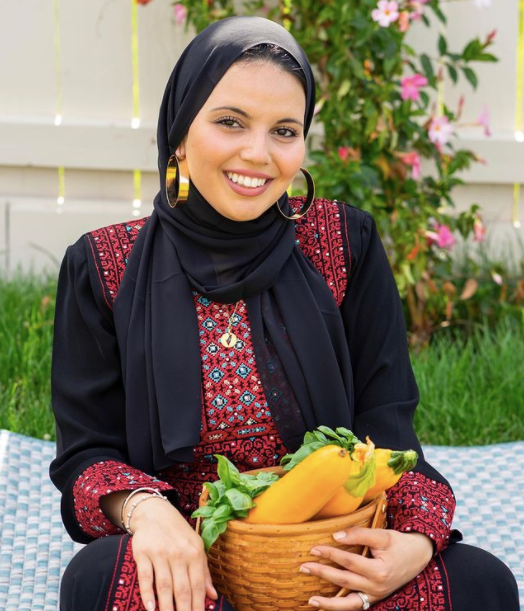
The time spent at home has also allotted me more time to focus on my food blogging and more time to be even more creative in the kitchen! It has allowed for my love for food to blossom even more so, as I was able to dedicate more time to this passion.
Who are your role models in the kitchen, personally (among your family and friends)?
My mother, my aunt and my grandmothers. I have learned so much first hand by watching all of these women in the kitchen. I wanted to preserve my Palestinian roots with the knowledge and skillset I learned from them all these years. It always looked so effortless and enjoyable to them while they cooked and baked, which really impacted me. Their food was always made with passion, and you could literally taste in every bite. You have to cook with love to feel the love in one’s dishes. I really believe that.
Where can one watch or subscribe to this cooking series series? When will it debut?
This Arab cooking course launched on March 24 and can be purchased from the sales page on my website, where one will have access to all 20 of my cooking classes, e-cookbooks, meal plans and spice and pantry guide. Individuals will also be able to leave comments and questions with each class that will be answered of course. There is also a note section for each video and the recipe written with the videos!e sources right in front of them.
There is a charitable aspect to this cooking series. Please tell me about that!
There is a charitable aspect to this cooking series. Please tell me about that!
In the videos of my cooking classes, I am wearing handmade aprons embroidered with tatreez (stitching native to Palestine) made by women artisans from the West bank. I actually came out with my own collection with Darzah Designs, which is a non profit organization that helps provide jobs for these women in Palestine by creating these beautiful handmade quality pieces. If anyone wishes to purchase and support this cause, check out the Apron Collection page on my blog.
A lot of people have gotten into food photography and food blogging especially during this pandemic! Any advice for the amateur food blogger?
My advice is to just go for it! If it is something you really want to do, then just dive in. I recommend sticking to a niche that you are most passionate about, whether that may be baking, cake decorating or Arabic cuisine. You don’t have to have a blog/website from the beginning. Start with social media and share what you love but also don’t be discouraged if it takes time to grow. It took me more than three years to get to where I am today but that is more than okay, and I gladly dedicate my time to it. You never know until you try.
Subscribe to be the first to know about new product releases, styling ideas and more.
What products are you interested in?

